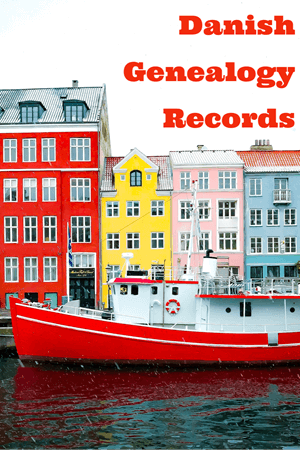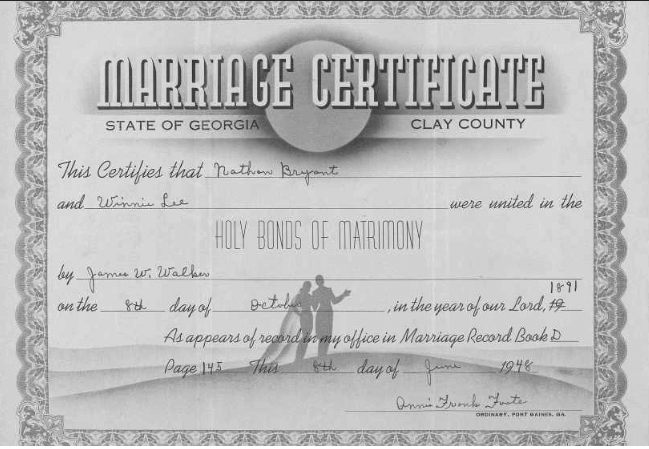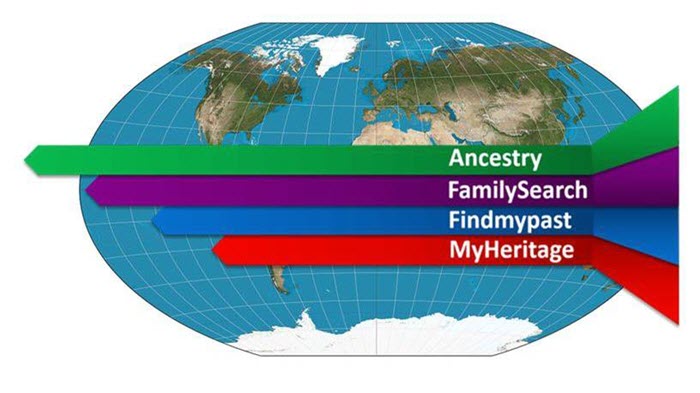New online! Denmark church records, Yorkshire parish records, English and Irish estate records, French church and civil registration records, German vital records, Irish townland indexes, and U.S. collections for Georgia, New York, Ohio and Pennsylvania. They’re all new at the Genealogy Giants: Ancestry.com, FamilySearch.org, Findmypast.com and MyHeritage.com.
Featured: Denmark church records
Genealogy Giant MyHeritage.com has published an exclusive new collection, Denmark Church Records, 1813-1919. According to the site, these are “records of births, baptisms, marriages, deaths, burials, and other records kept by the Evangelical Lutheran Church in Denmark. Church records are extremely important for Danish research as vital events of virtually every individual who lived in Denmark during the time period covered by this collection were recorded in these parish registers or church books (kirkebøger).”
The records include the typical birth or baptisms, confirmations, marriages, deaths and burials but also may include the following, as described on the site:
- “Vaccinations (Vaccinerede) – The vaccination mandate began in 1810 required everyone to receive the smallpox vaccine, unless the person at already had the pox. Vaccinations typically occurred when children were quite young. These records usually list the name of the person receiving the vaccine, date of vaccination, their father’s name, and their age or birth date. A person’s vaccination date could also be recorded in their confirmation record, and if they ever moved, could be noted in their moving in or moving out record.
- Moving In (Tilgangsliste) and Moving Out (Afgangsliste) Records – Began in 1812 and list individuals moving in or moving out of a parish. These records may contain name, age or birth date, occupation, residence, vaccination date, moving date, and where moving to/from.”
England parish records
Subscription giant Ancestry.com has published a new collection of indexed images, Yorkshire, England: Church of England Parish Records, 1538-1873. According to its description, “Parish records–primarily baptisms, marriages, and burials–provide the best sources of vital record information in the centuries before civil registration. Baptismal records generally list the date of the baptism, the name of the child being baptized, and the name of the father. Marriage records generally include the date of the marriage and the names of the bride and groom. Burial records generally list the date of the burial and the name of the deceased individual. Occasionally burial records will include other bits of information, such as where the individual was from or if he/she was a widow. Records from various parishes throughout Yorkshire will continually be added to this database for the next couple of months.”
UK subscription site Findmypast.com has published Prerogative Court Of Canterbury Administrations 1660-1700. Subscribers may “search over 88,000 transcripts and images of Index slips and related documentation created from original Prerogative Court of Canterbury administrations held by The National Archives at Kew. This collection includes a high volume of mariners; approximately a third of these records refer to a mariner. Each record will reveal the date of your ancestor’s will, the value of their will, the archive reference number and any additional notes.”
England and Wales electoral registers
Findmypast.com has released an exclusive new collection, England & Wales, Electoral Registers 1920. According to the site, “Electoral Registers are lists created annually of people who are eligible to vote and include their reason for eligibility, such as their residence or ownership of a property. These records from 1920 will include the men and women who first gained the right to vote in 1918….These newly indexed records can be searched by name, year, constituency, polling district and keyword.”
France church and civil records
Nearly 8 million records comprise a new, free collection at FamilySearch.org: France, Dordogne, Church and Civil Registration, 1540-1896. Among the documents included are baptism, birth, marriage and death records. According to the site, these can be an incredibly rich resource for identifying your French ancestors:
- Birth records often include the child’s name, gender, birthdate, birthplace, parents’ names (including mother’s maiden) and marital status, father’s age, father’s occupation and residence and the names of witnesses or godparents, along with their ages, occupations, and residences.
- Marriage registers may include the names, ages, birthplaces, occupations and residences of the bride and groom; marriage date and place; marriage certificate and banns date; names of the bride’s and groom’s parents (including mother’s maiden); and the witnesses’ names, occupations, and ages.
- Death records may include the deceased’s name, age at death, cause of death, gender, marital status, death and burial date and place, birth date and place, name of spouse, and father’s name and occupation.
For help reading these French-language records, click here.
Germany vital records
Ancestry.com has recently published or updated several new collections of German vital records:
- Saaldorf-Surheim Births, Marriages, and Deaths, 1876-1983. This new collection “includes the civil registers of births, marriages, and deaths from Saaldorf-Surheim,” a local registry office. According to the collection description, “The collected records are arranged chronologically and usually bound together in the form of yearbooks.”
- Meinersen, Germany, Births, 1874-1904, Marriages, 1874-1935 and Deaths, 1874-1974. These new collections contain German-language vital records from the Historisches Archiv der Samtgemeinde Meinersen.
- Hesse, Germany, Births, 1851-1901, as well as Marriages, 1849-1930 and Deaths, 1851-1958 have all been updated with additional records.
Ireland wills and townland indexes
Ancestry.com has published a new collection spanning nearly 300 years: Ireland, Index to the Prerogative Wills, 1536-1810. The source of this collection is a previously-published volume by the same name (ed. Sir Arthur Vicars; originally published in 1897, Dublin, Ireland; Genealogical Publishing Co., 1989). The collection description explains the historical process of proving wills in Ireland. This particular collection relates to a specific type of estate: “The Prerogative Court of the Archbishop of Armagh, latterly established at Henrietta Street, in Dublin, proved the wills of testators dying with assets of value greater than £5 (“bona notabilia”) in at least two Irish dioceses. This court was also abolished by the Court of Probate Act 1857.”
Findmypast.com also has new Irish records: Ireland, Alphabetical Indexes To The Townlands and Parishes 1851-1911. Browse “2,900 records taken from indexes of townlands and parishes in Ireland spanning the years 1851 to 1911. In addition to townlands and parishes, discover details of baronies and electoral divisions in Ireland for a given year.”
U.S. genealogy record collections by state
Georgia. A new, free collection, Georgia, Houston County, Marriage Records, 1832-2015 is available at FamilySearch.org. According to the site, “Marriage records usually include: the name of the groom, the maiden name of the bride, the names of the officiator and witnesses, the marriage date [and] the marriage place.” The collection link above goes just to the index, but you can also click here to see a full list of the various digitized volumes in this collection in the FamilySearch Catalog (with links to the digital images).
The site also offers an important tip: “Many marriages recorded in the South are separated by race in volumes, books, or registers. Be sure to check to determine if you have the right set of marriage records.” For example, there is a volume dedicated to “Marriage certificates (colored), 1891-1951,” which you’ll find in the above-named list of volumes in the FamilySearch Catalog.
United States genealogy records by state
New York. Subscription-access giant MyHeritage.com has added over 6 million records to its collection of New York City Marriage License Index 1908-1972, bringing the index to nearly 10 million names. According to the site, “This collection is an index to marriage licenses filed at the New York City Clerk Offices from the five boroughs from 1908 to 1972. The index contains the given names and surnames of both the bride and the groom, the date of the license application, and the license number. Images provided by Reclaim the Records.”
Ohio. FamilySearch has added over 150,000 free indexed records to Ohio, County Naturalization Records, 1800-1977. The collection includes images of naturalization records from county courthouses in Ohio and a growing number of indexed names. According to the site, “The record content and available years vary by county, though most content falls between 1818 and 1954.” You can either search indexed names on the collection page or scroll down and select the option to browse through over a million images that may not have been indexed yet. (These images are grouped by county, then by record type, year range and volume, making it relatively easy to find the records you want. Click here for a tutorial on browsing records on FamilySearch.org.)
Pennsylvania. Over 200,000 records have been added to the free FamilySearch.org collection, Pennsylvania, Eastern District Petitions for Naturalization, 1795-1931. Again, this images-and-indexed names collection is not yet completely indexed, and you may search it by browsing. Petitions are arranged by year and petition number.
Millions of records on the Genealogy Giants
Ancestry.com, Findmypast.com, MyHeritage.com, and FamilySearch.org publish millions of new historical records online every month. Keep up with the new collections of these Genealogy Giants with me here at Genealogy Gems. Bring focus to your research: click here to learn what sets apart each of the Genealogy Giants, and learn strategies for getting the most out of them.
Disclosure: This article contains affiliate links and Genealogy Gems will be compensated if you make a purchase after clicking on these links (at no additional cost to you). Thank you for supporting Genealogy Gems!

About the Author: Sunny Morton
Sunny is a Contributing Editor at Lisa Louise Cooke’s Genealogy Gems; her voice is often heard on the Genealogy Gems Podcast and Premium Podcasts. She’s known for her expertise on the world’s biggest family history websites (she’s the author of Genealogy Giants: Comparing the 4 Major Websites); writing personal and family histories (she also wrote Story of My Life: A Workbook for Preserving Your Legacy); and sharing her favorite reads for the Genealogy Gems Book Club.








